Education Programs Target Social Challenges in Mississippi
RIDGELAND, Miss.—A small group of seventh-grade boys in blue T-shirts sat on the floor in a spacious classroom at the Scientific Research facility in Ridgeland, Miss., focused on the small screws that attached a rolling track to a gear that would allow Team SCARLET’s robot to move. Piles of gears, wheels, metal rods, nuts, bolts, screws, and miscellaneous robot components of every description filled plastic buckets, boxes and bins.
Nearby, three older girls—all veteran robotics competitors—readied the parts for the cherry-picker crane that would sit atop their robot. Together, they were preparing for the 2021 First Tech Challenge. Judges for the annual robotics contest examine the design, construction and problem-solving skills of simple robots based on an annual theme. Criteria include overall size of the robot, its functionality and what obstacles it must overcome.
Kia Graham, an electrical engineer from New Orleans who commutes to Jackson each week, oversees and leads Team SCARLET. The name is an acronym that stands for “Science Creations Are Real, Let’s Evolve Together.”
“My job is to teach basic engineering concepts like soldering, coding and assembling gears so that our team of budding engineers can build a robot,” Graham told the Mississippi Free Press.
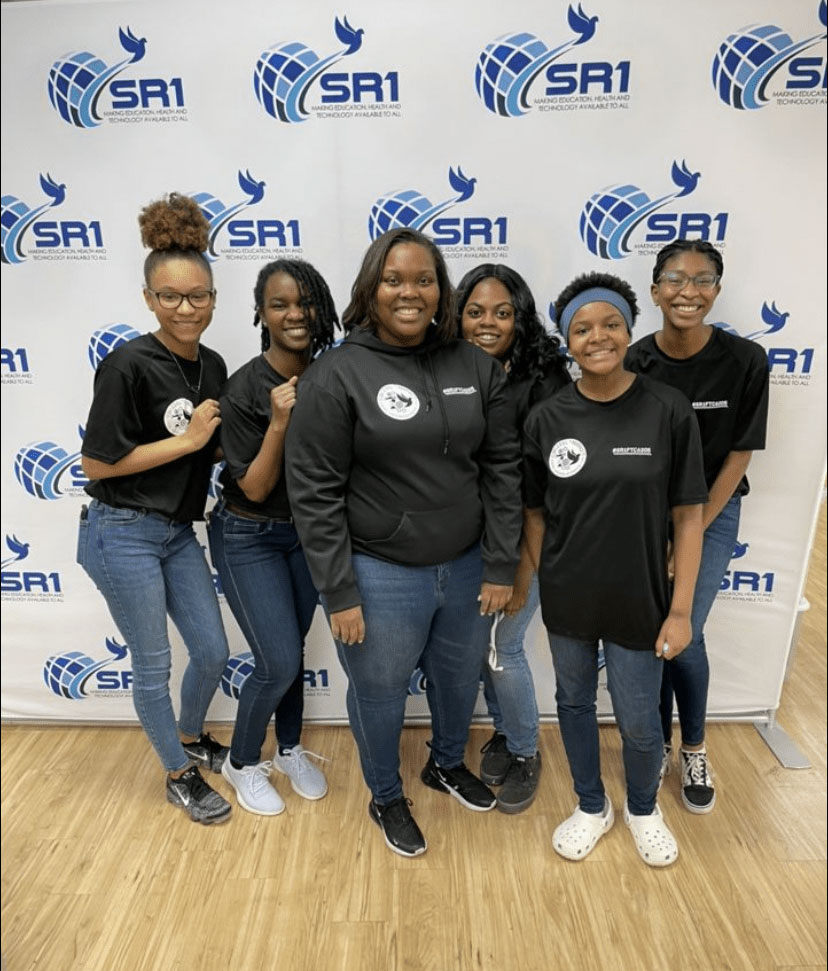
Team SCARLET contains between six and eight students from SR1. Its size and composition change annually depending on interest and on how many students have graduated to create vacancies.
“We had an all-girls team a few years back,” said Graham, who has been volunteering at SR1 for over a decade. “(Nowadays), we have younger boys with a few older girls helping them along, which is a really interesting dynamic.”
“The theme (for 2021 was) freight frenzy,” she added. “Each team (had) to build a robot no bigger than 18 inches that can move on its own, pick up boxes, manage an obstacle course and then deposit those boxes into a dome at the other end of the field.”
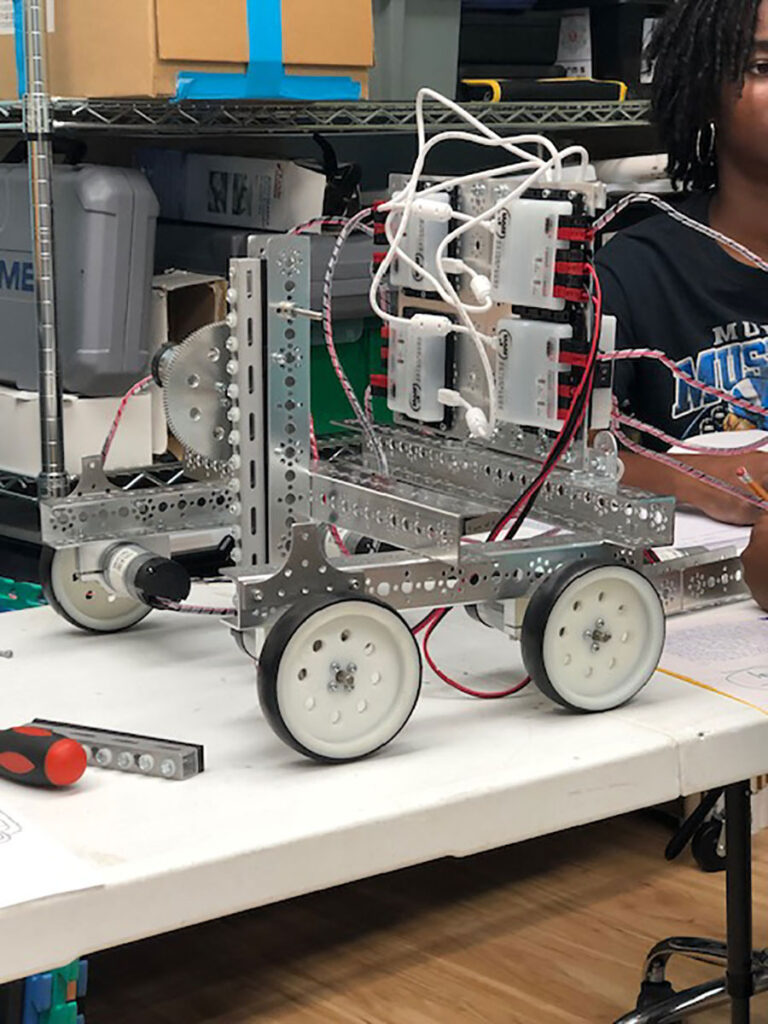
Team SCARLET, whose members were dressed in matching black T-shirts and scarlet-red baseball caps, planned a bot that would use military-style treads encasing six wheels and a crane (the “cherry picker”) on top to handle cargo. “We (had) two minutes to move as many boxes as possible,” Graham explained.
Despite careful coding, the cherry picker’s claw was off by 2 inches. Team SCARLET rushed to repair the error before the competition began, but a competitor team’s robot ultimately managed to move more boxes in the allotted time. Despite the loss, the students walked away with valuable lessons: teamwork, accepting loss gracefully, and hunting down problems and fixing them for another try. “We call that build, test, repeat,” Graham said with a laugh.
Challenges like this one prepare students to become good engineers. SR1’s programs help students form cooperative bonds and develop skills that assist them in competitions such as FTC and prepare them for other STEM fields they may pursue in science, technology, engineering or mathematics.
“Everything around you has been designed by or looked at by an engineer,” Graham explained. “Take the chair you’re sitting on; you trust it will hold you because an engineer designed it that way. Same with your phone, your car, even roads and bridges. Engineers solve the world’s problems using math and science.”
Seeing A Need, Facilitating A Solution
Forest, Miss., native Tamu Green founded SR1 in 2005 because he believes that STEM disciplines are critical to compete in the global economy, and he wanted to provide opportunities for those from his home state. The nonprofit, incorporated in 2007, strives to eliminate disparities in education, health, and technology through science, technology and partnerships.
“The place where you grow up you should help first,” Green told the Jackson Free Press in 2011. “It will take a whole crusade to turn this ship around, but you have to start somewhere.”
Green graduated from Mississippi State University in 1993 with a bachelor’s degree in information systems and in 1994 with an MBA.
“I was a tech guy, computers and business. I am an engineer at heart, I think,” the CEO told the Mississippi Free Press. “I am always trying to figure out how to fix things.”
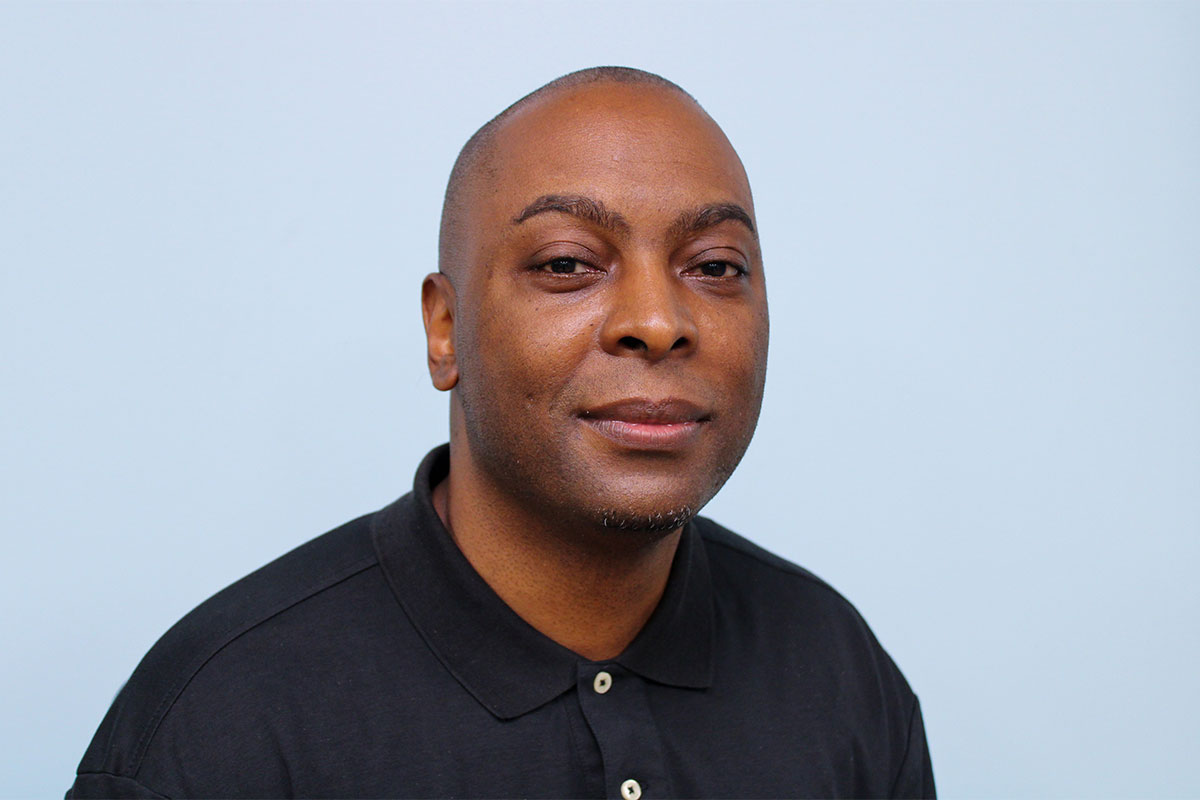
Eleven years in state government keeping records of vital statistics on illnesses like HIV and various forms of cancer helped Green identify another piece of the puzzle. “I saw the economic statistics for Black Mississippians were much worse than for other social groups,” he explained.
Economic disparity led to educational disparity in his community, Green determined, and he wanted to be part of the solution.
“I saw that something simple, like having access to information, was very important early in a child’s education,” he said. “Missing that one key piece, a computer, meant that some kids were behind from day one.”
Under the umbrella of SR1, Green formed a team of dedicated and passionate leaders to help realize his mission, he said. Approximately 300 students and families in Hinds, Madison, Scott, Rankin, Leake, Smith and Neshoba counties participate annually in the many programs the nonprofit offers.
Most of the projects have a STEM foundation and fall under the C.O.O.L. umbrella, which stands for Community Oriented Opportunities for Learning. Green says they are evidenced-based, innovative and data-driven. The six overarching program areas, which focus on sustainable solutions, are academic and innovation, civic literacy, family and relationships, life and career skills, healthy lifestyles, and outdoor and recreation.
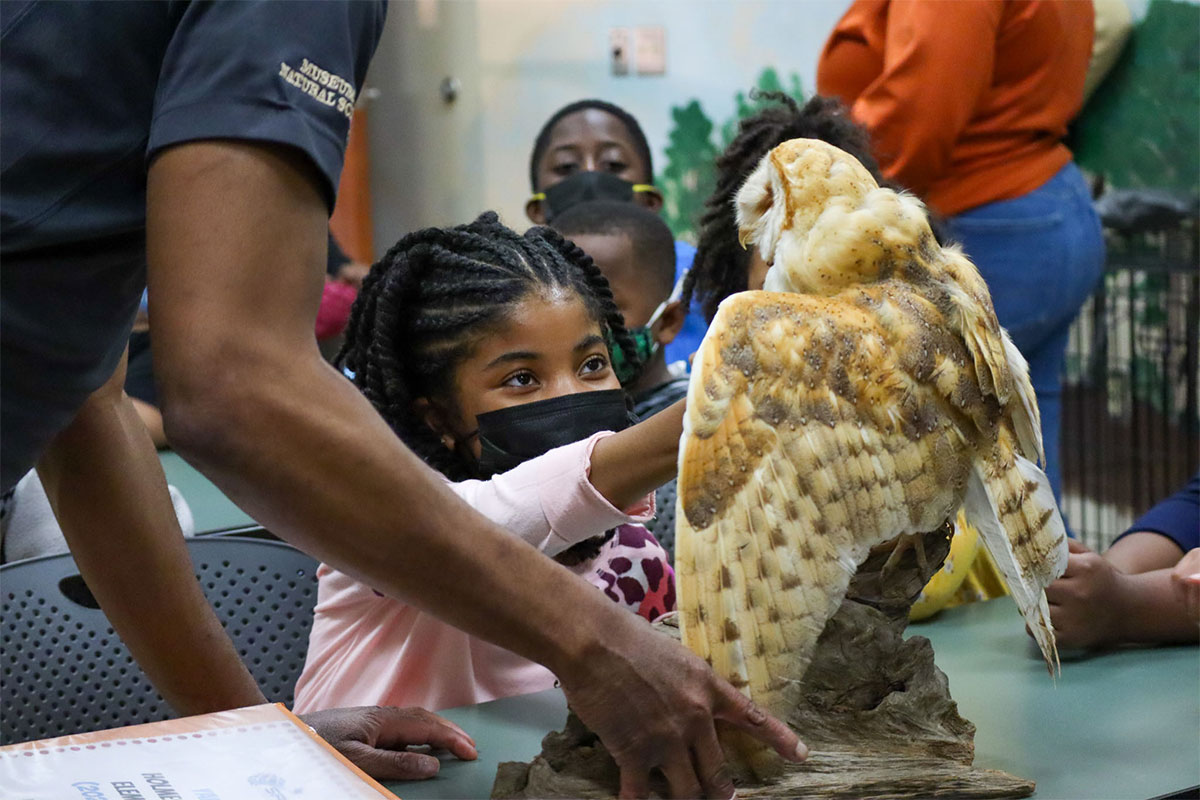
Each program area targets a different social challenge. For example, the family and relationships program area contains teen-pregnancy prevention classes called C.O.O.L. Healthy that educate students about health, goal setting, consent and building healthy relationships. Relationship Smarts PLUS 4.0 is geared toward middle-school students (grades five through eight), and Love Notes is geared toward high-school teens (grades nine through 12), including teenage parents and students who have dropped out.
Within the academic and innovation program area are several school-based projects such as C.O.O.L. Forest, C.O.O.L. Jackson and C.O.O.L. Literacy, each allowing children to receive individual help to build better reading comprehension and improved writing skills. SR1 also holds after-school classes, field trips to the Mississippi Museum of Natural Science to visit the animals and fresh-food cooking demonstrations from professional chefs.
C.O.O.L. Talks, Bite-Sized Education Tools
In early 2020, SR1 added a new project under its civic-literacy program area: C.O.O.L. Talks. The nonprofit posts the educational interview series on its new YouTube media channel, C.O.O.L Media Network. A learning tool both for students and adults, the series features firsthand accounts of historic events, as well as information and educational resources for students and parents.
“C.O.O.L. Talks are usually 15 to 30 minutes,” SR1 Videographer and Video Producer Arin Inge said. “Our primary target audience is grown-ups, but we also write for younger children, so everyone can learn something new.” SR1 worked with the Mississippi Department of Archives and History for archival footage.
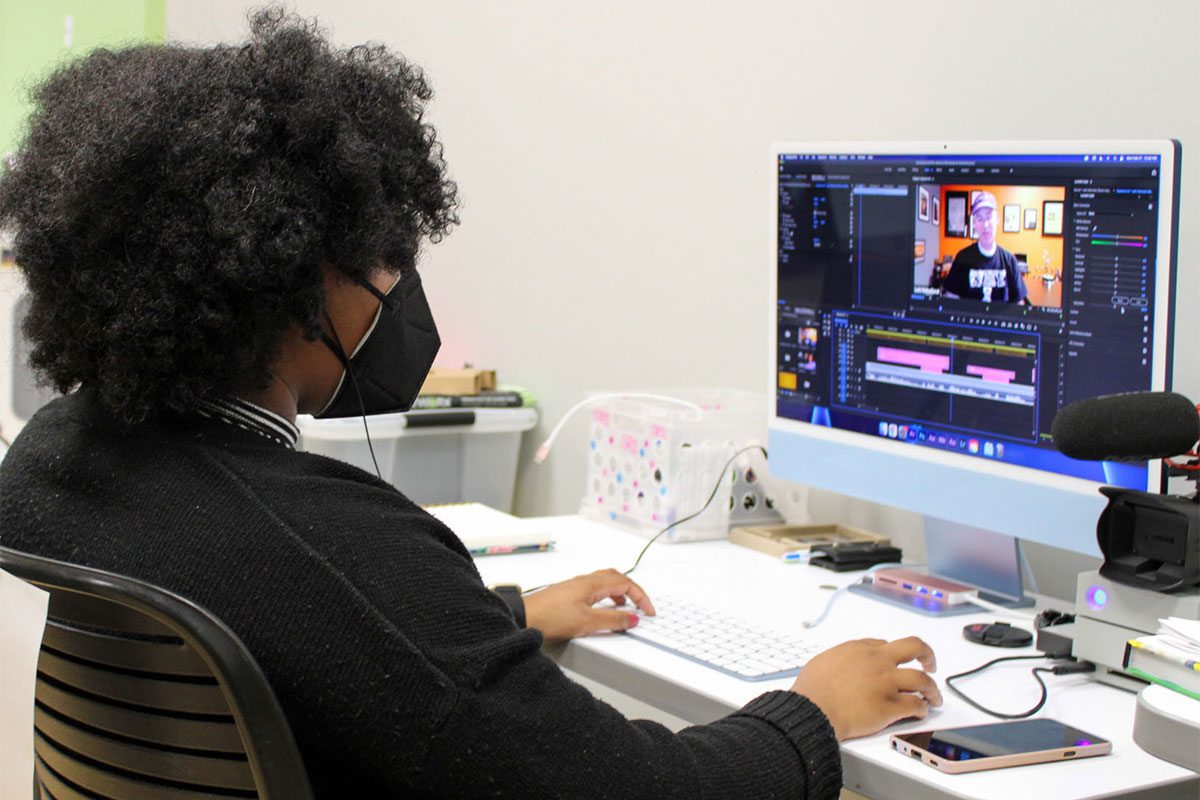
The first episode debuted last year and focused on the life of Joan Trumpauer Mulholland, a white civil-rights activist and Tougaloo College graduate who endured unabashed hatred during the Civil Rights Movement.
SR1 also encourages civic literacy by observing national days of service such as Giving Tuesday and Make A Difference Day, introducing its participants to the concepts of altruism and philanthropy.
Combating Food Scarcity, Small-Scale Farming
The latest branch on the SR1 tree is an organic-farming project that the U.S. Department of Agriculture sponsored through a grant to help socially disadvantaged people develop organic farms. The C.O.O.L. Farming project is designed to educate and train 70 farmers to plan, launch and sustain independent organic farm businesses.
“We’re doing research and development and in-the-field testing on methods including “no till” and new ways to conserve the soil,” Jasmine Hendrix, a Mississippi State University food-science professor who served as SR1’s Agriculture and Food Science Department director, told the Mississippi Free Press in 2022 prior to resigning in November.
“We are interested to see how many people want to try organic farming. This is change at the roots—sowing seeds, helping with food equity and having access to nutritious foods at the dinner table.”
| https://www.youtube.com/watch?v=qAzQsf0GgoE |
| SR1’s C.O.O.L. Farming project, free to participants, helps beginner farmers and ranchers develop skills to launch and sustain their own agricultural businesses as part of the program’s mission to promote organic farming with an emphasis on assisting socially disadvantaged Mississippians. Video courtesy SR1 |
Science specialist Jailyn Smith helped design the farms and tested different plant varieties for eventual use, including on a micro-scale, for use in backyards or even containers.
“Right now, there’s a need for mustard and collard greens because they are easy to grow and are very nutritious,” she said. “This project will show farmers how they can grow crops in hoop houses (think ‘greenhouse’), aeroponically or hydroponically on the porch or patio, or even inside the house in a small block of soil.”
In November, the successful project held its first giveaway of more than 250 pounds of nutritious collards grown on the farm plot in Forest. “The purpose of the mini-farm is to support SR1’s goal of eliminating health disparities in Mississippi,” Tamu Green said. The farm will continue to grow fresh, organic, vitamin-rich greens in food desert areas and provide the produce to community members at no cost.
“We are so happy about this pilot project,” Green continued. “Collards are perfect. Not only are they high in vitamins A and C, but they are also culturally appropriate and delicious to Southern taste buds. This helps promote healthy eating which can reduce health problems.”
The group held a second giveaway at the Forest farm on Dec. 21, 2022, and plans to distribute at least 1,000 pounds of produce and expand its greens to more locations, possibly including grocery stores, this year.
‘The More Our Youth Know, the More Choices They Have’
As SR1 celebrates 15 years of helping young central Mississippians, Tamu Green still optimistically creates new programs to add to the nonprofit’s services.
One of the latest ideas to roll out is C.O.O.L. Kids, an initiative that spotlights a group of fictional children in many skin colors, ethnicities and creeds; SR1 hopes they may serve as role models for young viewers. Keeping with the STEM theme, the cartoon children have catchy names reminiscent of various branches of science: Ardie Art, Mary Ann Veterinarian, Steve Read, Volomer Astronomer, Ryan Rhymes, Sara Science, Beckie Techie and Ignacio Ingeniero.
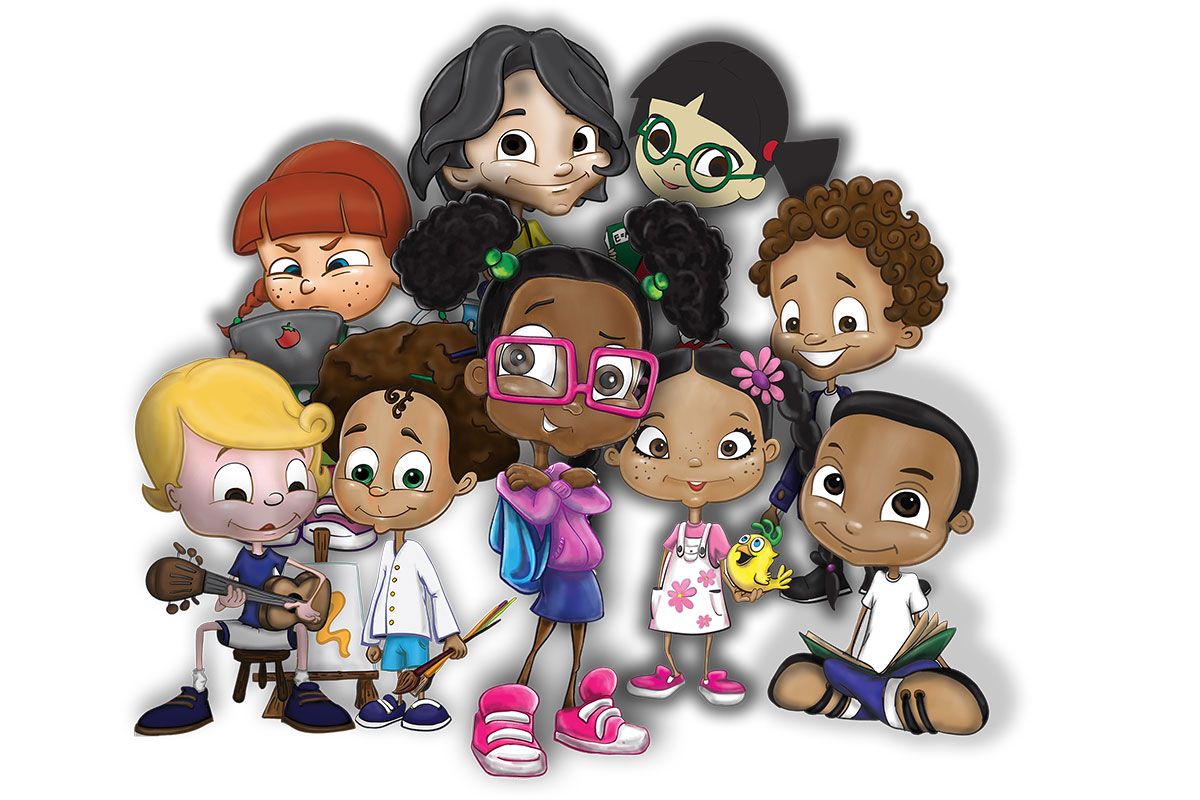
The foremost C.O.O.L. Kid is an African American young woman with two ponytails who wears a bright pink sweater and tennis shoes. “You’ll notice Mady (Madelyn Mathematics) in front has on matching pink glasses,” Green said. “That’s to show her intelligence. To show she’s both a cool kid and a smart kid.”
These characters have already been included in a coloring book for children, and SR1 believes the group of kids can be used in later projects as well to help kids feel represented and to help them understand the many career options available to them.
“Social modeling is so important,” Green explained. “Children need to see people who look like them in positions of authority. All the kids today say they want to be rap stars when they grow up, but there are so many other careers they can’t even imagine because they don’t know they exist.”
“Ultimately, with all the programs in SR1, it’s about exposure,” he added. “The more our youth know, the more things they see, the more choices they have … and the more they can do and become.”
For more information on Scientific Research (369 Towne Center Blvd., Ridgeland), better known as SR1, call 601-206-4544 or visit sr1tech.org.
